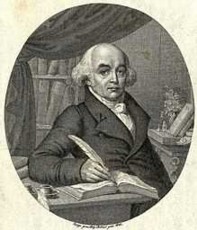| Samuel Hahnemann  AKA Samuel Christian Friedrich Hahnemann AKA Samuel Christian Friedrich Hahnemann
Born: 10-Apr-1755
Birthplace: Meissen, Saxony, Germany
Died: 2-Jul-1843
Location of death: Paris, France
Cause of death: Illness
Remains: Buried, Père Lachaise Cemetery, Paris, France
Gender: Male
Race or Ethnicity: White
Sexual orientation: Straight
Occupation: Doctor, Paranormal Nationality: Germany
Executive summary: Founder of homeopathy The German physician and founder of homeopathy Samuel Hahnemann was born at Meissen in Saxony on the 10th of April 1755. He was educated at the "elector's school" of Meissen, and studied medicine at Leipzig and Vienna, taking the degree of M.D. at Erlangen in 1779. After practicing in various places, he settled in Dresden in 1784, and thence removed to Leipzig in 1789. In the following year, while translating W. Cullen's Materia medica into German, he was struck by the fact that the symptoms produced by quinine on the healthy body were similar to those of the disordered states it was used to cure. He had previously felt dissatisfied with the state of the science of medicine, and this observation led him to assert the truth of the "law of similars", similia similibus curantur, that diseases are cured (or should be treated) by those drugs which produce symptoms similar to them in the healthy. He promulgated his new principle in a paper published in 1796 in C. W. Hufeland's Journal, and four years later, convinced that drugs in much smaller doses than were generally employed effectually exerted their curative powers, he advanced his doctrine of their potentization or dynamization. In 1810 he published his chief work, Organon der rationellen Heilkunde, containing an exposition of his system, which he called homoeopathy, and in the following years appeared the six volumes of his Reine Arzneimittellehre, which detailed the symptoms produced by "proving" a large number of drugs, i.e. by systematically administering them to healthy subjects. In 1821 the hostility of established interests, and especially of the apothecaries, whose services were not required under his system, forced him to leave Leipzig, and at the invitation of the grand-duke of Anhalt-Cothen he went to live at Cothen. Fourteen years later he removed to Paris, where he practiced with great success until his death on the 2nd of July 1843. Statues were erected to his memory at Leipzig in 1851 and at Cothen in 1855. He also wrote, in addition to the works already mentioned, Fragmenta de viribus medicamentorum positivis (1805) and Die chronischen Krankheiten (1828-30.) Needless to say, the basis of Hahnamann's homeopathic approach to medicine is entirely fraudulent, though it is still practiced today.
Father: Christian Gottfried Hahnemann
Mother: Johanna Christina Spiess (d. 1790)
Wife: Henriette Küchler (b. 1-Dec-1763, m. 1-Dec-1782, d. 1827, 11 children)
Daughter: Henrietta (b. 1783)
Son: Frederick (b. 1786)
Daughter: Wilhelmina (b. 1788)
Daughter: Caroline (b. 1791)
Daughter: Frederika (b. 1795)
Son: Ernst (b. 1798)
Daughter: Eleonore (b. 1803)
Daughter: Charlotte (b. 1805)
Daughter: Louisa (b. 1806)
Wife: Mélanie d'Hervilly-Gohier (m. 18-Jan-1835)
High School: St. Afra, Meissen (1775)
Medical School: University of Leipzig
Medical School: University of Vienna
Medical School: MD, University of Erlangen (1779)
Professor: University of Leipzig (1811-12)
Exhumed 1898
Do you know something we don't?
Submit a correction or make a comment about this profile
Copyright ©2019 Soylent Communications
|